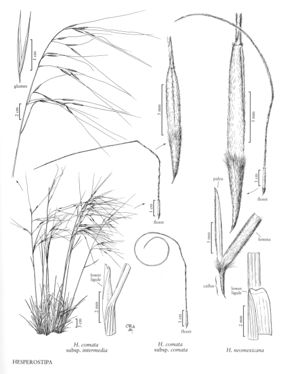familyPoaceae
subfamilyPoaceae subfam. Pooideae
genusHesperostipa
speciesHesperostipa comata
subspeciesHesperostipa comata subsp. comata
Hesperostipa comata subsp. comata
Treatment appears in FNA Volume 24. Treatment on page 158.
Lower cauline nodes usually concealed by the sheaths. Panicles often partially included in the uppermost sheath at maturity. Awns 75-225 mm, terminal segment 40-120 mm, sinuous to curled. 2n = 38, 44, 46.
Discussion
Hesperostipa comata subsp. comata grows on well-drained soils of cool deserts, grasslands, and sagebrush associations, at elevations of 200-2500 m. It is widespread and often abundant in western and central North America, particularly in disturbed areas. It is similar to H. neomexicana, differing primarily in having awns that are either not hairy or have hairs that are no more than 0.5 mm long, and in having thinner, longer ligules. Intermediates to H. neomexicana exist but are not common.
Selected References
None.
Lower Taxa
None.
... more about "Hesperostipa comata subsp. comata"
